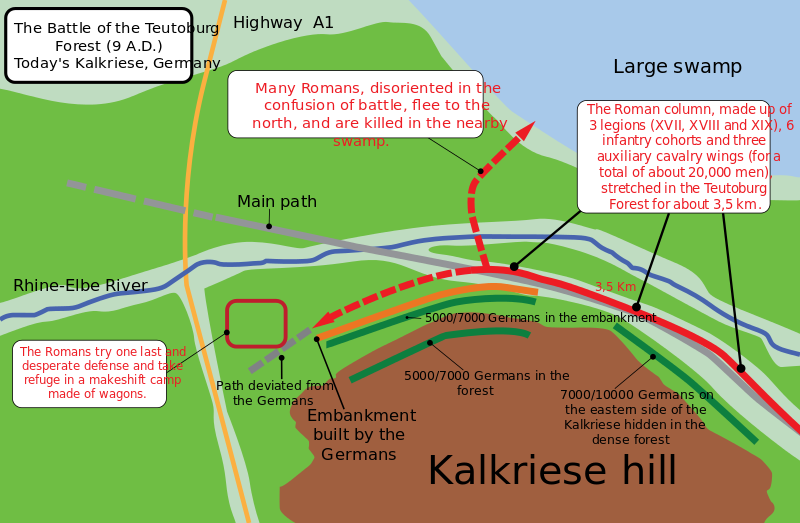The folks at UnHerd are starting a series of “alt histories” to help explore the inflection points of history that may have led to a very different world, like the outcome of the Imperial Roman disaster in Germany’s Teutoburger Wald in 9AD:

Map showing a tactical overview of the Battle of Teutoburg Forest including troop movement.
Map by Cristiano64 originally for a non-English Wikipedia page, which explains the weird translated captioning.
If history teaches us anything it’s that we should expect the unexpected. But history, unlike the news, is something that’s already happened. Historians, unlike journalists, see events in the rearview mirror. As a result, they’re rather prone to deterministic explanations. For instance, there’s the Whig view of history with its narratives of ever-increasing freedom. Marxists, meanwhile, situate historical events within an overarching process of class struggle. Indeed, from millenarians to environmentalists to the friends and foes of the Anglosphere, everyone’s trying to bend the arc of history.
[…]
For instance, why didn’t the Roman Empire conquer the German lands beyond the Rhine? A determinist might reach for some geographical explanation — the territory was inhospitable and the locals scary. And yet similar obstacles didn’t stop the the Romans from assimilating Britannia, so why not Germania too?
Well, because three Roman legions were wiped out at the Battle of the Teutoburg Forest, that’s why — and there was nothing pre-determined about that catastrophe. It required the mother of all ambushes, made possible by the extreme cunning of the German chieftain Arminius and the extreme gullibility of the Roman commander Varus. It could easily not have happened – and thus, untraumatised by such an unexpected and total defeat, the Romans might have extended the northern frontier to the Elbe or beyond.
What would a Romanised Germania have meant for the rest of history? It’s impossible to say, but we can imagine an unRomanised Gaul. The existence of France (and the French language) as we know it today depends on the fact that, two thousand years ago, the Romans conquered Gaul, but not Germania. Had things gone differently, French (and therefore British and therefore American) history would have developed along a very different path.
What this example also tells us is just how much of history depends on the character, abilities and decisions of particular individuals (contrast the ruthless brilliance of Julius Caesar in the case of Gaul with the trusting foolishness of Varus in the case of Germania). There’s something called the great man theory of history. It was a 19th Century idea and deeply unfashionable today, but while the individuals who change the course of history aren’t necessarily “great” or, indeed, men — there’s no doubting their existence.
They don’t have to be heroes or villains. In fact, they don’t have to have much authority of any kind. Their impact doesn’t even have to be the result of a deliberate decision. They just have to do the right (wrong) thing in the right (wrong) place at the right (wrong) time. For instance, someone, somewhere, did something that introduced the Covid-19 virus to the human population. Whether that was eating a bowl of bat soup or dropping a test tube in a laboratory we’ll probably never know; but whatever it was, it made all the difference.
That’s why we can’t leave alt history to the historians alone. While some of them might see merit in exploring counterfactuals, their commitment to academic rigour acts as a constraint upon their speculations. Quite right too, but there’s also a case for letting our imaginations run riot — and for that we need story-tellers.



